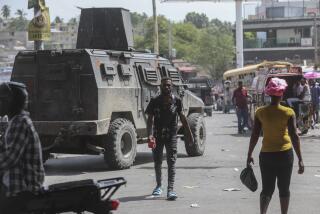Security Council Agrees to Extend Mission in Iraq
- Share via
UNITED NATIONS — The U.N. Security Council unanimously approved a year’s extension for the U.N. mission in Iraq on Thursday, an operation that has yet to get off the ground because of growing insecurity.
The resolution affirms the U.N.’s “leading role” in assisting the Iraqi people and government in the nation’s rebuilding and formation of an elected government. But Secretary-General Kofi Annan emphasized in a report on the Iraq mission last week that security concerns remained paramount, and that he would limit the number of U.N. staffers in the country as long as they were regarded as “high-value, high-impact” targets.
Annan’s newly appointed special representative for Iraq, Ashraf Jehangir Qazi, is scheduled to arrive in the country this week to head the U.N. mission. He will take up the post left vacant by Sergio Vieira de Mello, who was killed along with 21 others in a suicide bombing attack on the U.N.’s Baghdad headquarters nearly a year ago.
The attack shook the entire organization, which had rarely been considered a target and was largely unprepared. The U.N. withdrew all of its international staff from the country in October after a second fatal attack on its building, but many Iraqi employees across the country have tried to continue their work for the U.N.’s humanitarian aid agencies.
Qazi’s small team of political experts will help prepare a national conference scheduled for Sunday to select an interim advisory board for the caretaker government. Initially scheduled for the end of July, the conference had been postponed -- at the urging of the world body -- to bring more opponents into the process. It wasn’t clear by Thursday whether key political groups that had threatened to boycott the conference had been persuaded to participate.
The rest of the U.N. team will remain based in Amman, Jordan, and fly into the country as needed to help organize elections scheduled for January, and to assist in drafting a new constitution.
A recent Security Council resolution provided for a “distinct” force to provide protection for U.N. staffers, but no country has committed troops yet, leaving the U.N. dependent on the U.S.-led multinational force for security. Saudi leaders have proposed an “Islamic force” to eventually take over from the multinational force, but potential participants have imposed conditions on their involvement to justify the risk of sending soldiers to such a volatile area.
Pakistani Ambassador Munir Akram said Thursday that Annan had requested his country’s help, along with those of five others, but that Islamabad had not yet made a decision.
“Obviously, this will be a decision for each country to make in accordance with its own evaluation of the situation,” Akram said.
More to Read
Sign up for Essential California
The most important California stories and recommendations in your inbox every morning.
You may occasionally receive promotional content from the Los Angeles Times.










